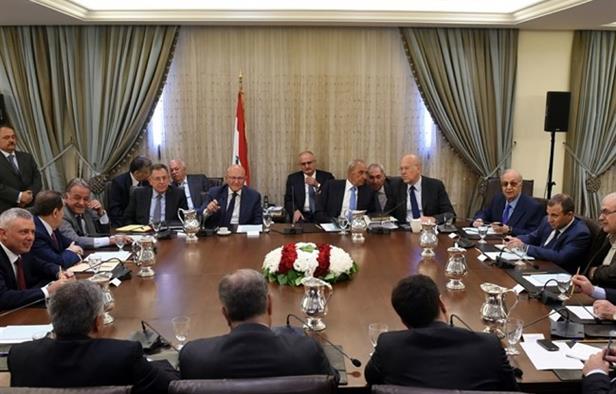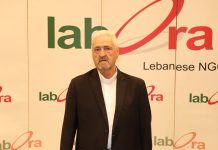Dangerous liaisons/Why the national dialogue In Lebanon is moving in worrying directions
Michael Young/Now Lebanon/August 04/16
There was an alarming bit of news coming out of the second day of the national dialogue session on Wednesday. The participants reportedly discussed two sensitive issues: the formation of a senate and administrative decentralization.
Though administrative decentralization was on the agenda of the dialogue, no one seemed to reflect on what the larger implications were. Sami Gemayel, the Kataeb leader, seemed to be happy, as was Ali Fayyad, one of the Hezbollah representatives. The establishment of a senate and administrative decentralization were two issues that were raised in the Taif accord, but never implemented. In other words they are constitutional matters and their discussion in the national dialogue, rather than in parliament, suggested an expansion of the role of the dialogue sessions. And it is this that is worrisome.
The reason is simple. Nabih Berri, the speaker of parliament, along with Hezbollah, are suspected of wanting to create a forum above parliament to push for constitutional changes that would favor the Shiite community, and by extension Hezbollah. That could have been the implication of Berri’s proposal last May for a package deal on the presidency—or as he put it “going to a new Doha”—whose parameters the speaker never defined.
But now, with the dialogue effectively addressing constitutional issues and not limiting itself to a political arrangement that would merely facilitate a presidential election, these parameters are being defined by the participants themselves.
One has to turn to the two issues to see why this is dangerous. The senate proposal was inserted into Taif as a counterpoint to the declared aim of abolishing political confessionalism. As the 50-50 Christian-Muslim ratio was eliminated in parliament and other state institutions, the idea was for a senate to be created in which confessional representation would be preserved. The wording in Taif is vague on representation in the senate, but the institution’s role is to address “major national issues,” in that way reassuring Christians who would lose the most once political confessionalism was eliminated.
In other words the national dialogue has put the idea of abolishing political confessionalism back on the table, albeit indirectly, by discussing a senate. And it went a step further by raising the issue of administrative decentralization, another sop Taif threw to the Christians for them to approve the accord. The reasoning was that if Christians were given more administrative latitude to manage their local affairs, they would accept amendments reducing their power at the national level.
In absolute terms both ideas are perfectly defensible. The Christians can only gain by approaching their role in the state in a proactive way, and not holding on to their share of the state so stubbornly that it will be forcibly taken away from them. Indeed, that process has already begun in many respects.
However, what is wrongheaded in approaching constitutional change through the national dialogue is both the context and the intentions behind it. First, as issues with constitutional implications, abolishing confessionalism and administrative decentralization must be addressed solely by parliament. The dialogue has no constitutional legitimacy, and defending it by arguing that parliamentarians will simply approve what their leaders tell them to is untrue. There is more room for dissent in parliament, particularly on essential national questions.
Secondly, there are the intentions. If Berri is trying to be the impresario of constitutional changes that benefit the Shiites and Hezbollah in particular, that means that a breakdown in consensus is inevitable. Hezbollah has not allowed the election of a president since 2014 most probably to increase its leverage in such a process. Because the Sunnis will not approve of changes that strengthen Hezbollah and the Shiites, the intention appears to be to work on the Christians, in such a way that a Shiite-Christian consensus can impose change on the Sunnis.
That could explain why the questions of a senate and administrative decentralization are being raised now. While the senate would rise on the ashes of the 50-50 Christian-Muslim quota under Taif, it would also preserve such a quota in the senate. Decentralization would allow Christians to sustain the illusion that they are more independent in a state dominated by Muslims. And both objectives, because they are a part of Taif, would allow Berri and Hezbollah to say that they are respecting the accord, which Sunnis view as sacrosanct.
But what lies underneath is a different reality. The Christians may merely be dupes in a game to increase the Shiites’ political strength in the state at the expense of the Sunnis. And Hezbollah’s holding the presidency hostage always indicated that it had ulterior motives—possibly to broaden Shiite power and in that way institutionally anchor itself in the state and lay the groundwork for its long-term hegemony over it.
Developments in Aleppo have been reassuring to the party. If the city falls into the hands of the Assad regime, that may more or less signal the end of the uprising in western Syria, even if the fighting continues in many areas for some time. Already, Hezbollah, Iran, and the Assad regime can delight in the fact that Turkey and Saudi Arabia, their main regional foes, are entwined in their own problems, neutralizing them in Syria.
But changing the Lebanese constitution without a national consensus can be perilous. The Sunnis will not supinely stand by while power is wrested away from them. And if they do, their moderates risk being marginalized to the advantage of extremists. The Christians hold the key, and rather than defend the illusory prerogatives that Hezbollah may hand them, they have to think of Lebanese concord first.
**Michael Young is a writer and editor in Beirut. He tweets @BeirutCalling.




















